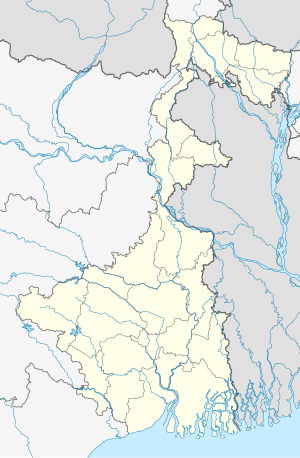Bally railway station
Bally | ||||||||||||
|---|---|---|---|---|---|---|---|---|---|---|---|---|
| Kolkata Suburban Railway station | ||||||||||||
 Bally Station | ||||||||||||
| Location | Bireswar Chatterjee Road, Bally, Howrah, West Bengal India | |||||||||||
| Coordinates | 22°39′22″N 88°20′26″E / 22.656116°N 88.340607°ECoordinates: 22°39′22″N 88°20′26″E / 22.656116°N 88.340607°E | |||||||||||
| Elevation | 8 metres (26 ft) | |||||||||||
| Owned by | Indian Railways | |||||||||||
| Operated by | Eastern Railway | |||||||||||
| Line(s) | Howrah–Bardhaman main line and Howrah–Bardhaman chord | |||||||||||
| Platforms | 7 | |||||||||||
| Tracks | 3 | |||||||||||
| Construction | ||||||||||||
| Structure type | Standard (on-ground station) | |||||||||||
| Parking | No | |||||||||||
| Bicycle facilities | Yes | |||||||||||
| Other information | ||||||||||||
| Status | Functioning | |||||||||||
| Station code | BLY | |||||||||||
| Division(s) | Howrah | |||||||||||
| History | ||||||||||||
| Opened | 1854 | |||||||||||
| Electrified | 1958 | |||||||||||
| Previous names | East Indian Railway Company | |||||||||||
| Services | ||||||||||||
| ||||||||||||
| ||||||||||||
| Location | ||||||||||||
 Bally Location in West Bengal | ||||||||||||
Bally railway station is a Kolkata Suburban Railway station on the Howrah–Bardhaman main line and Howrah–Bardhaman chord line. It is located in Howrah in the Indian state of West Bengal. It is under the jurisdiction of Eastern Railway zone. Bally railway station is a small railway junction of Howrah railway division. It serves Bally and surrounding areas. It is 8 km. from Howrah Station.[1][2]
History[]
East Indian Railway Company started construction of a line out of Howrah for the proposed link with Delhi via Rajmahal and Mirzapur in 1851.[3]
The first passenger train in eastern India ran from Howrah to Hooghly on 15 August 1854. The track was extended to Raniganj by 1855.[3]
Electrification[]
Electrification of Howrah—Burdwan main line was completed with 25 kV AC overhead system in 1958.[4]
References[]
- ^ "Bally Railway Station Map/Atlas ER/Eastern Zone – Railway Enquiry". Retrieved 27 June 2019.
- ^ "Bally Railway Station (BLY) : Station Code, Time Table, Map, Enquiry". Retrieved 27 June 2019.
- ^ Jump up to: a b "IR History Part I 1832–1869". IRFCA. Retrieved 13 April 2013.
- ^ "IR History Part IV 1947–1970". IRFCA. Retrieved 13 April 2013.
- Railway stations in Howrah district
- Howrah railway division
- Kolkata Suburban Railway stations
- West Bengal railway station stubs


